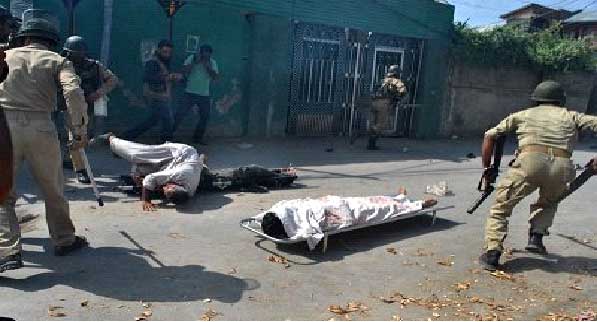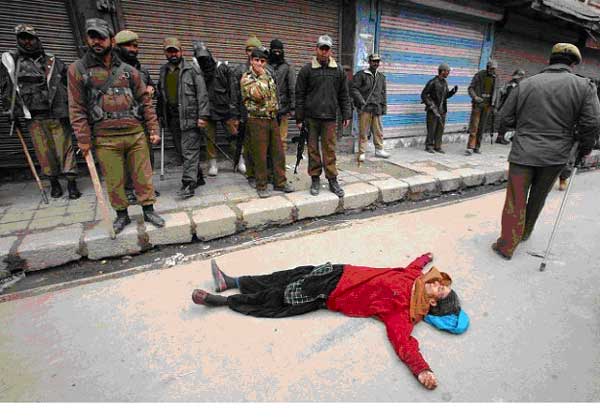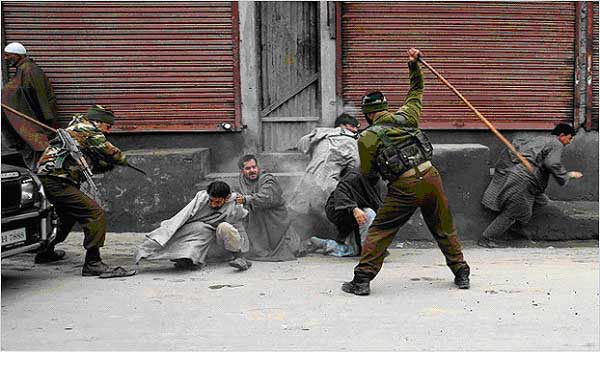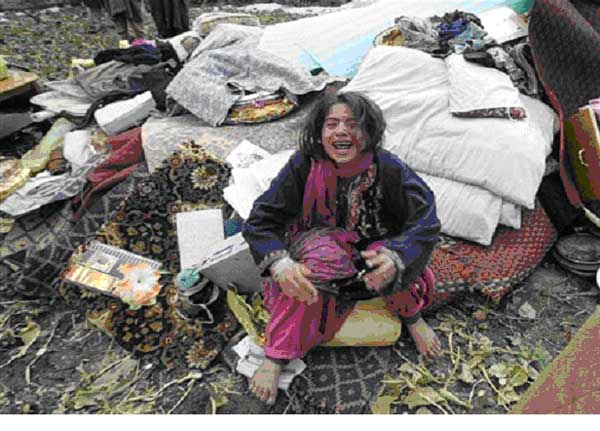The Role Of ‘Memory’ In The Present Crises In Kashmir
By Inshah Malik
01 August, 2010
Countercurrents.org

Dead bodies disrespected and mourners punished are scars and scratches on the memory in Kashmir
The street politics has overwhelmingly captured the political arena of ‘good governance’ in Kashmir. Street politics is alive and kicking above all democratic, it appeals scores of people gradually and the legitimated government watches this ‘topsy-turvy’ stunt at the bay. The politics other than the mainstream seems to be the one shinning bright on the futuristic goals of Kashmir’s politics. In the light of the fact that the claims of the young street boys appease the people more than Omar’s NC government needs a clear cut analysis. How does the politically immature youth lure the common Kashmiris support as against a promised good future or material well being? Delhi uses its myopic judgment on Kashmir as the final inference both at national and international levels. It comes handy for India to blame Pakistan than to introspect and dig deeper in the murky politics in Kashmir.

Disrespect for human life leads to anger which crushes hope and leads to resistance and not terrorism
The functional television and news media in India is allotted the role to reinforce the existent myths and ideas on Kashmir. Labeling protests as ‘unarmed terrorism’ has distanced the power and the street all the more. After India failing to provide even basic justice, leave alone the ultimate resolution of Kashmir issue, Kashmiris are standing on a scathing record of human rights abuse, unfulfilled political promises and broken pledges. Whenever the governance has detached itself morally from the people the collapse of that government in Kashmir has almost become predictable. Since the inception of the Indian rule in Kashmir many a time the political governance failed as it could not meet the expectations of the common people of which ‘Self determination’ was the biggest aspiration.
The fact that most of people wanted to enjoin their sacred right to determine their political and national status did not hamper some governments in the past to continue being successful for the time they could manage the close ties with the common people. The current government has failed to see the repercussion of ignoring the public dissent and inciting the despondency among people by proffering to exaggerate the ‘economic growth’ which has remained Delhi’s only awareness in Jammu and Kashmir.
The youth discerned with this detachment of government policies with their issues made it a point to create space to toss their anger at the state’s inefficiency culminating into ‘Friday protests’. Government unaware of root causes of such activity created a scenario retaliating the stone pelting youth with armed force which had somehow become a 20-20 cricket show on the streets of Kashmir. Although these boys sought their political voice in the separatist factions but government’s immaturity and inexperience provided enough space for this to become an obsession of Kashmiri youth.

Government’s means of dialogue can solve nothing in Kashmir
Tufail ahmed Mattoo was consistently the 5th teenager killed since January 2010 in a playground by the State military cops, for the state it was nothing more than a incident for which it thought a sorry could terminate this misdemeanor. However in the street, Tufail’s death was not interpreted just as yet another case or incident but it bought the question of ‘memory’ of loss right back at the people. The person who had lost his son about twenty years back in 1980’s regretted his personal loss yet again and it was deduced to be the loss or common suffering that everyone in Kashmir has seen or experienced. Interestingly the current uprising of the stone pelting youth aggravated by the rampant human rights abuse found its sympathizers even among the older generation who fought with Sheikh Abdullah for the plebiscite protest in 1960’s and their strategies also employed stone pelting.

Standing on the scathing record of abuse: wailing the only resource to survive in Kashmir.
In 2008 the Amarnath land issue exposed Kashmiris yet again to their vulnerabilities under Indian rule and in 2009 the twin rape and murder in Shopian resurrected the vulnerability and the memory of deceit suffered from Indian state. For consecutive three years these incidents have bought the memory of loss flipside and it has sharpened the edges of the resistance. The memory has a huge reverence in all historical conflicts and resistances. The Jews till today have kept the memoirs of the holocaust animate for the fact that it reciprocates the collective shared pain. The Kashmiri population is certainly the one that could never mourn its dead because the incidents of death never died and nor did the aspirations. There has never been a stage of moving on and even if it has come for a time being, the political follies of the state and Indian rule have ruined it.
Political talks and oppression can’t go hand in hand; one of these measures has to be clogged to strive for the sustainable solution of Kashmir crises. The immature governance sees the root cause of the problem outside the state but pure analysis can tell that this current resistance is the outcome of ‘memory’ instigated by state’s dim-witted response to the concerned youth.
Inshah Malik is a PhD scholar at the Tata Institute of social sciences, Mumbai, India
[email protected]

